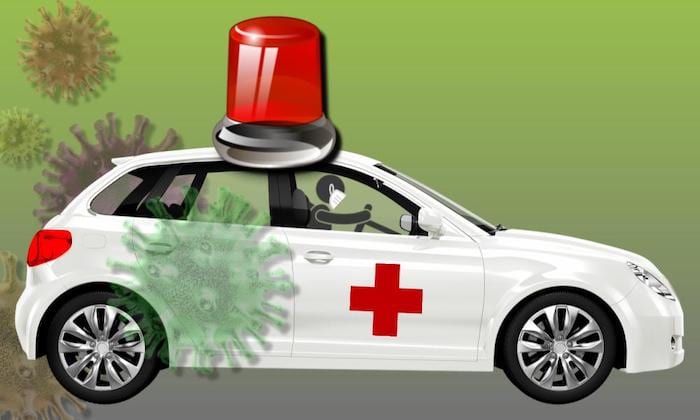
Isn’t it extremely dangerous, at this time, for these industries to intensify relationships in which Uber and Lyft drivers pick up prospective COVID-19 patients, and without warning?
Over the last three years, Uber and Lyft have partnered with non-emergency medical transportation companies, or NEMTs, which arrange transportation services for tens of millions of Americans—on Medicaid, Medicare, or private plans—who do not have rides to and from hospital and doctor appointments.
It’s no surprise that Uber and Lyft got in on this business. It’s a $3 billion market, and for NEMTs it’s cheaper to use Uber and Lyft than to hire and train their own drivers. The arrangement also substantially expands their reach in meeting the demands of patients. Lyft, for example, partners with LogistiCare, which serves 24 million patients nationwide across all 50 states and is the country’s “largest manager of non-emergency medical transportation (NEMT) programs for state government agencies and managed care organizations.”
Here’s the problem: these partnerships could impact the health of the public during the coronavirus pandemic. Insured members who want to be tested for COVID-19 can request rides through NEMT companies like LogistiCare, making for exchanges that expose not only Uber and Lyft drivers to the virus, but also anyone who uses rideshare companies, since they could catch it from drivers or medical patient riders.
Lives are being put on the line, because the health insurance industry is too cheap and inhumane to pay for its own support staff, and has instead turned untrained Uber and Lyft drivers into frontline medical workers.
On March 12, Lyft and LogistiCare announced plans to expand and extend their partnership. Even after the COVID-19 threat became clear, the companies doubled down, overlooking the consequences of their collaborative impact on public health. In a press release, Dan Greenleaf, CEO at The Providence Service Corporation, LogistiCare’s parent company, said, “Lyft has been an exceptional partner that is instrumental to LogistiCare’s success. This collaboration ensures millions of Americans will get to their medical appointments in a dependable way, even the most vulnerable who may not otherwise get the care they deserve. … We appreciate the professionalism of drivers on the Lyft platform and couldn’t be more pleased to have extended our relationship.”
In my experience as a rideshare driver in New England, on weekdays, LogistiCare pickups make up approximately at least 25 percent of my overall rides. That considered, drivers like me, who aren’t given the option of not driving these customers, are already assuming significant risk behind the wheel—often picking up at potential COVID-19 danger zones like airports and bus terminals. Add in the contractual addition of hospitals and other medical centers to this list of hotspots—in the midst of a growing pandemic—and it seems the health insurance and rideshare industries are recklessly exposing drivers and the broader public to acute, unnecessary risk. Isn’t it extremely dangerous, at this time, for these industries to intensify relationships in which Uber and Lyft drivers pick up prospective COVID-19 patients, and without warning?
Since Uber and Lyft do not offer comprehensive paid sick leave beyond an emergency plan announced earlier this week, a lot of rideshare drivers continue to work through this crisis, and will keep driving until they experience cold or flu-like symptoms. Some will even continue to drive after they get visibly sick. Gig workers, like delivery and rideshare drivers, are typically exempt from state and city-wide bans, since they provide so-called essential services. Many are also dependent on income from driving to pay for monthly bills and rent. As a result, those with COVID-19, before they even know it, could get riders sick.
Some drivers are quitting in protest. In a recent Twitter thread, Stephen MacKinnon, a full-time Uber and Lyft driver in Portland, Maine wrote, “I’ve made the difficult decision to stop driving for these companies even though I will be left with no income. The health of my passengers and myself are paramount. Specifically…I’ve given a ride to a passenger from the Jetport [airport] who told me as he exited my car that he had to go into quarantine; I’ve picked up numerous passengers from Maine Med who exhibited signs of significant respiratory illness. Despite constant sanitizing…I don’t feel that it’s possible to ensure the safety of the public traveling in my vehicle.”
MacKinnon raises another problem with Uber and Lyft driving NEMT patients: “These pickups are quite often extremely ill individuals (many have just completed hours long dialysis treatments for example). These people should NOT be riding in…a Lyft vehicle that has been transporting people from the Jetport and transportation center.”
According to the Centers for Disease Control and Prevention, sick people on dialysis, or coming out of cancer treatment centers after chemotherapy, or cardiovascular treatment centers, etc. are much more vulnerable to the effects of the coronavirus.
During this period of crisis, at least, medical patients and the general public should be separated, not deliberately mixed together by companies that are apparently more concerned with profits than the lives of the people they claim to serve.
*The author is anonymous, as they hope to continue driving for rideshare companies.
